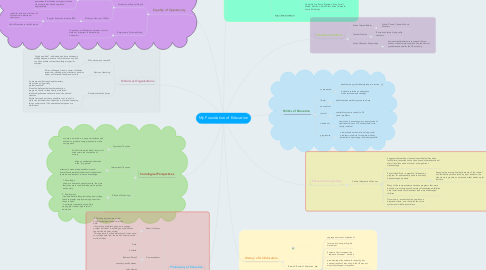
1. Sociological Perspectives
1.1. Functional Theories
1.1.1. society is a machine - one part articulates with another to produce energy required to make society work
1.1.2. Emile Durkheim beleived that moral values were the foundation of society
1.2. Interactional Theories
1.2.1. helps us understand education in the "big picture"
1.2.2. attempt to make everyday behaviors and interactions between students and students and teachers and students common knowledge
1.3. Effects of Schooling
1.3.1. 1. Knowledge -the more education people receive, the more likely they are to read and take part in politics and society
1.3.2. 2. Employment -students believe that graduating from college leads to greater employment opportunities - they are right! -most large organizations and high paying jobs require high levels of education
2. Philosophy of Education
2.1. Generic Notions
2.1.1. -Difficult questions were asked and Plato helped to search for the truth. -His method of philosophy was to engage another individual in a dialogue and question the individuals point of view -This approach is called dialectic and it was used to move people from the world of matter to the world of ideas
2.2. Key researchers
2.2.1. Plato
2.2.2. Aristotle
2.2.3. Bertrand Russell
2.2.4. Jean-Jacques Rousseau
2.2.5. John Dewey
2.3. Goal of Education
2.3.1. John Dewey had a vision that schooling must be understood as part of the larger project of social dimensions His philosophy made an attempt to balance the social role of school with its effects of development of individuals
2.4. Methods of Instruction
2.4.1. Children learn individually and in groups
2.4.2. Problem solving method - children pose questions about what they want to know
2.5. Curriculum
2.5.1. Dewey had a notion of a core (integrated) curriculum
3. Schools as Organizations
3.1. Who becomes a teacher?
3.1.1. "Highly qualified" individuals who have obtained a college degree, who have full certification and who can demonstrate content knowledge in specific subjects.
3.2. Nature of teaching
3.2.1. Roles: colleague, friend, nurturer, facilitator, researcher, developer, administrator, decision maker, professional leader and activist
3.3. Professionalization Issues
3.3.1. -Lortie argued that teaching elementary school was only partially professionalized. -Goodlad believes that teacher education programs should include clearly articulated relationships between education and the arts and sciences. -McNeil wrote about the contradictions of control in which she indicated that if attention is placed on keeping things under control, the educational purposes are diminished.
4. Equality of Opportunity
4.1. Students with Special Needs
4.1.1. Education of All Handicapped Children Law (1975)
4.1.1.1. right to access public education programs, individualization of services, "least restrictive environment", scope of services to be provided by schools and a set of procedures for determining them, guidelines for identifying disability, and the principles of primary state and local responsibilities
4.1.1.2. guarantees that children with special needs are properly identified and placed appropriately
4.1.2. Efficacy of the Law (1980s)
4.1.2.1. Regular Education Initiative (REI)
4.1.2.1.1. called for inclusion of almost all children into mainstream classrooms
4.1.2.1.2. this still remains in conflict today
4.2. Response to Coleman Study:
4.2.1. Organizational differences between schools were not important in determining outcomes.
5. Politics of Education
5.1. conservative
5.1.1. enables strong individuals/groups to survive
5.1.2. looks at evolution as adaptation to the environments changes
5.2. liberal
5.2.1. belief that free market is prone to abuse
5.3. neo-radical
5.4. radical
5.4.1. capitalist system is central to US social problems
5.5. traditional
5.5.1. view schools as necessary to transmission of traditional values of US society (hard work, family, initiative)
5.6. progressive
5.6.1. view schools as central to solving social problems, a vehicle for upward mobility, essential to developing individual potential
6. History of US Education
6.1. Brown V. Board of Education
6.1.1. segregation is unconstitutional
6.1.2. focal point during civil rights movement
6.1.3. Supreme Court reversed the "separate but equal" doctrine
6.1.4. provided legal foundation for equality, but unequal results of schooling in the US was not magically changed in response
6.1.5. Brown served to underscore the discrepancies that pointed to the American belief in equality of opportunity for African-Americans and other minorities
7. Curriculum and Pedagogy
7.1. Developmentalist Curriculum - relates to the needs and interests of the students
7.2. Alabama Stakeholders:
7.2.1. House of Representatives: Terri Sewell, Martha Roby, Mo Brooks, Bradley Byrne, Robert Aderholt, Gary Palmer and Michael Rogers
7.2.2. State Superintendent: Dr. Tommy Bice
7.2.3. State School Board Representatives: Mary Scott Hunter, Stephanie Bell, Ella Bell, Cynthia McCarty, Betty Peters, Al Thompson, Yvette Richardson, Jeffrey Newman
7.2.4. Huntsville City Superintendent: Casey Wardynski
7.2.5. Huntsville City Board Members: Elisa Ferrell, Walker McGinnis, Beth Wilder, Mike Culbreath, Laurie McCaulley
7.3. http://www.alsde.edu/
8. Educational Inequality
8.1. Cultural Deprivation Theories
8.1.1. Suggests that working class and nonwhite families often lack cultural resources such as books and other educational stimuli and thus arrive at school at a significant disadvantage
8.1.2. Project Head Start - a preschool intervention program for educationally and economically disadvantaged students
8.1.2.1. based on the assumption that because of the cultural and familial deprivation faced by poor students, the schools must provide an environment that makes up for lost time
8.1.3. Many of the compensatory education programs that were based on its assumptions about why disadvantaged children have lower levels of achievement than more advantaged children
8.1.4. Oscar Lewis - asserts that the poor have a deprived culture - one that lacks the value system and middle-class culture
9. Educational Reform
9.1. School based Reform
9.1.1. School Choice, Charter Schools, Vouchers
9.2. Teacher Quality
9.2.1. Recruit and retain high quality teachers
9.3. School-Business Partnerships
9.3.1. business leaders became concerned that our nations schools were not producing the kinds of graduates needed for the US economy
